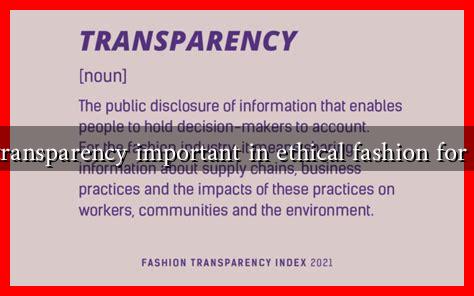-
Table of Contents
Why is Transparency Important in Ethical Fashion for Women?
In recent years, the fashion industry has faced increasing scrutiny regarding its ethical practices. As consumers become more aware of the environmental and social impacts of their purchases, the demand for transparency in fashion has surged. This is particularly significant for women’s fashion, where choices often reflect personal values and social responsibility. This article explores the importance of transparency in ethical fashion for women, highlighting its benefits, challenges, and the role it plays in shaping a sustainable future.
The Need for Transparency in Fashion
Transparency in fashion refers to the openness and clarity brands provide about their supply chains, production processes, and labor practices. It is essential for several reasons:
- Consumer Awareness: Women are increasingly seeking information about the origins of their clothing. A survey by Statista found that 66% of women in the UK consider sustainability when shopping for clothes.
- Ethical Consumption: Transparency allows consumers to make informed choices that align with their values, promoting ethical consumption.
- Accountability: Brands that are transparent are more likely to be held accountable for their practices, leading to improved labor conditions and environmental standards.
Building Trust with Consumers
Transparency fosters trust between brands and consumers. When women know where their clothes come from and how they are made, they are more likely to feel a connection to the brand. This trust can lead to brand loyalty and repeat purchases. For instance, brands like Patagonia and Eileen Fisher have built strong reputations by openly sharing their sustainability efforts and ethical practices.
Empowering Women Through Ethical Fashion
Transparency in ethical fashion also empowers women, particularly those in developing countries who are often the backbone of the garment industry. By supporting brands that prioritize ethical practices, consumers can contribute to:
- Fair Wages: Brands that are transparent about their supply chains are more likely to pay fair wages to their workers.
- Safe Working Conditions: Transparency ensures that brands are held accountable for the safety and well-being of their employees.
- Community Development: Ethical brands often invest in the communities where they operate, providing education and resources for women.
Challenges to Achieving Transparency
Despite its importance, achieving transparency in the fashion industry is fraught with challenges. Some of these include:
- Complex Supply Chains: The global nature of fashion means that many brands have intricate supply chains that are difficult to monitor.
- Greenwashing: Some brands may claim to be transparent or ethical without providing substantial evidence, misleading consumers.
- Cost Implications: Implementing transparent practices can be costly for brands, particularly smaller ones.
Case Studies: Brands Leading the Way
Several brands are setting the standard for transparency in ethical fashion:
- Everlane: Known for its “Radical Transparency” policy, Everlane shares detailed information about its factories, costs, and markups.
- Reformation: This brand provides a “Sustainability Score” for each product, allowing consumers to see its environmental impact.
- People Tree: A pioneer in sustainable fashion, People Tree emphasizes fair trade and transparency in its supply chain.
Conclusion: The Future of Ethical Fashion
Transparency is not just a trend; it is a fundamental aspect of ethical fashion that empowers women and promotes sustainable practices. As consumers continue to demand more information about their clothing, brands must adapt by being open about their practices. The benefits of transparency extend beyond consumer trust; they foster accountability, ethical labor practices, and community development. By supporting transparent brands, women can make informed choices that reflect their values and contribute to a more sustainable future.
In summary, transparency in ethical fashion is crucial for building trust, empowering women, and promoting accountability in the industry. As we move forward, it is essential for both consumers and brands to prioritize transparency to create a more ethical and sustainable fashion landscape.

